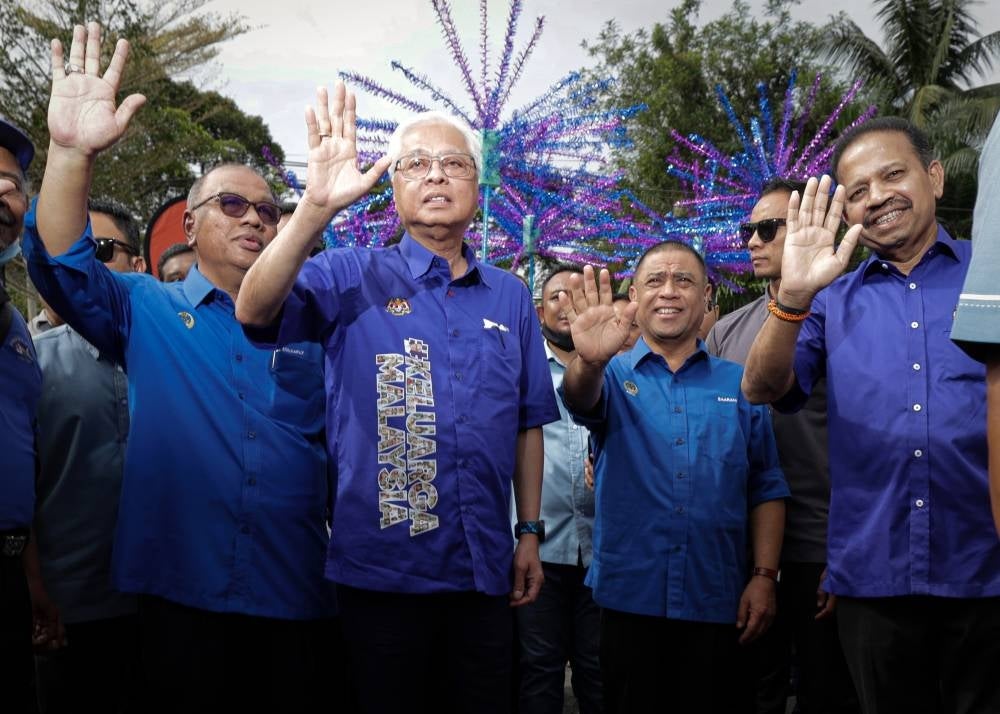Massive Felda rejection of BN huge factor behind hung Pahang assembly
20 Nov 2022 10:19pm

Throughout campaigning, BN appeared to be the choice in Pahang but the voters knew who they wanted. - Bernama Photo
It also meant that the scores of Felda settlements spread wide across the state can no longer be considered as BN ‘safe deposits’.
This became evident after the coalition lost the Felda votes in 12 out of 14 parliamentary seats in the state.
In yesterday’s polls, BN managed to win 16 state seats, one behind Perikatan Nasional (PN) while Pakatan Harapan (PH) secured eight seats.
There were 42 state seats at stake, but the contest in Tioman had to be postponed to Dec 7 after PN candidate Md Yunus Ramli, 61, died at 3.30 am on polling day from a suspected heart attack.
By late night, after the full results were in, BN, which won 25 seats to form the state government in 2018, found itself losing eight of its seats, namely Bukit Ibam, Kuala Sentul, Pulau Tawar, Pulau Manis, Lanchang, Kuala Semantan, Lepar and Sungai Lembing, all to PN.
Research Fellow at the Centre for the Study of Democracy and Elections, Universiti Malaya (UMCEDEL) Associate Professor Dr Mohd Izani Mohd Zain did not rule out the possibility that PN's efforts to take care of settlers' welfare and concerns in the short period when PN chairman Tan Sri Muhyiddin Yassin was Prime Minister was a factor in the swing towards PN.
Among his contributions were to abolish a portion of Felda settlers’ loans amounting to RM8.3 billion, to buy back 82 per cent of Felda Global Venture (FGV) shares, as well as approving the issuance of government-guaranteed sukuk worth RM9.9 billion to improve Felda's business model.
"They (settlers) still remember what Muhyiddin did but more important was how he championed PN as a clean and issue-free coalition that upheld integrity.
"This made voters view PN as a safer alternative to BN to continue to look after Malay and Islamic interests compared to PH," he told Bernama when contacted.
This was also why the ‘real’ clashes in Pahang were between BN and PN, and not PH, 16 of whose candidates lost their deposits, he said.
Mohd Izani, who is also an associate professor at the Universiti Putra Malaysia (UPM) Faculty of Human Ecology, said Pahang also "bore the effects” of the party’s problems at the central level like party leaders being embroiled in various issues that resulted in swing votes this time.
"The selection of candidates could also have led to BN’s failure to form the state government. They overestimated the strength of the candidates featured, whereas those capable of winning are usually the old timers who are experienced and have their own followers,” he said.
He cited the case of Maran parliamentary seat incumbent Datuk Seri Ismail Abd Muttalib who, after being dropped by BN, joined PAS and pulled off a shock win over Datuk Seri Shahaniza Shamsuddin (BN) with a majority of 1,821 votes.
Political analyst Dr Ainul Adzellie Hasnul, meanwhile, feels that the BN has to start a process of cleansing not only at the state level but also at the central leadership level if it aims to regain the people’s trust.
As such, the best platform for UMNO to cleanse itself from within is the party election that must be held within six months from yesterday’s GE15, he said, adding that UMNO should use the election to change leaders who have become a liability and to showcase youngsters.
"Give them a chance to lead and don’t place them in a precarious situation such as yesterday’s GE15, where many new faces were placed in gray or black areas, which is not the way to do things if UMNO is serious about rejuvenating the party,” he said.
He also felt that the wave of Malay voters rejecting BN, which is what happened at the central level, also caused a domino effect from north to south and in Pahang on the east coast.
"This rejection is happening quietly. Throughout campaigning, BN appeared to be the choice in Pahang but the voters knew who they wanted and this was reflected through the GE15 results,” he said. - BERNAMA










